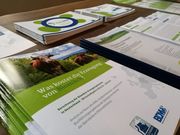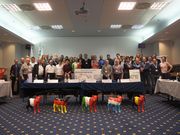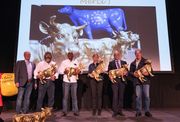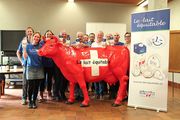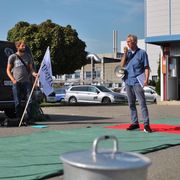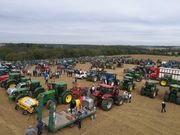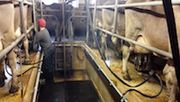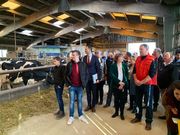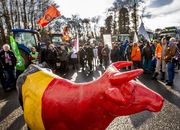EMB 2019: year in review
- Producing one kilogramme of organic milk costs 60.29 cents
- Dairy farmers from all over Europe calling for an effective crisis instrument!
- Bye, bye WhatsApp, hello Telegram!
- “We expect Federal Agricultural Minister Julia Klöckner to press Berlin and Brussels for urgent changes in the agricultural market policy.”
- International Fair Milk Conference: From Europe to Africa
- Launch of Faireswiss fair milk products
- Switzerland: Demonstration for a fair and transparent dairy market
- European milk strikes: Millions of litres & thousands of tractors
- A new power balance in the European Parliament
- Milk producer demonstration in Paris – Interview with Sylvain Louis, APLI chairman
- Study on supply structure in the dairy sector published
- When cheap and too much becomes dumping
- Ministerial farm visit – interview with Boris Gondouin
- Farmers’ border demonstration to demand a stop to CETA & Co.
Newsletter as PDF
Contact
EMB - European Milk Board asbl
Rue de la Loi 155
B-1040 Bruxelles
Phone: +32 - 2808 - 1935
Fax: +32 - 2808 - 8265
Dear dairy farmers, dear interested parties,

An eventful year is coming to an end. We at the EMB wish to take this opportunity to thank you all for the important work you have done over the last 12 months:
Thank you very much to all the farmers for their commitment!
Many thanks to all the consumers supporting us farmers, and
Warm thanks to the policy-makers advocating for a crisis-proof agricultural sector!
In this edition of the newsletter, we would like to stop and take stock of the important, striking events of 2019. Even though the end of the year brings the charming image of Father Christmas, fulfilling wishes and bringing presents, we dairy farmers are well-aware that our wishes and demands for cost-covering prices, which include fair remuneration, will not be granted without a fight. For yet another year, farmers have shown that they are ready to fiercely advocate for their profession and their sector. Not only by working day in, day out on their farms and producing high-quality food, but also by showing a strong political involvement alongside this important work.
Compelling actions by farmers
In January, a border action between Belgium and Germany saw a number of European organisations and farmers coming together to make a strong case for a fair trade policy. Two months thereafter, European dairy farmers and their colleagues from Africa united in Brussels for a memorable action to appeal to the European Commission to reign in overproduction in Europe with a smart crisis instrument. In addition, there were also actions in individual European countries like Switzerland, as well as a ministerial visit to a French farm, where farmers presented a clear picture of what is required for the sector and for future-proof milk production to policy-makers and processors. In Germany, the MEG Milch Board published an important study on supply conditions in the sector and the German dairy farmers' association BDM followed up on farmer protests in October by demanding that the incumbent Minister for Agriculture pushes for a change in agricultural market policy at once. With the aim of greater knowledge and transparency, these two association together with the EMB shall also publish a study on organic milk production costs in Germany from this year on.
The protests and events commemorating the 10th and 11th anniversary of the European milk delivery strikes were also a definite highlight. This event saw more than 600 tractors and over 1000 farmers from all agricultural sectors coming together in Ciney, Belgium at an action organised by MIG. Thousands of consumers and farmers also made their way to Mont-Saint-Michel in Normandy for the anniversary action organised by the French association APLI.
Fair milk prices are not impossible. This year, the Fair Milk projects demonstrated this once again in very practical terms in the different EMB member countries. And the progress continues – we are very happy to welcome a new member to the Fair Milk family: "Faireswiss" from the Swiss organisation Uniterre. At this year's Fair Milk Conference, it became clear that this model can be successful not only in Europe, but in African countries as well.
Fair Milk is not the only one to grow: This year, the EMB has also welcomed a new member into its fold. With APROLEP from Portugal, the EMB now represents 21 member organisations, all fighting together for responsible EU production in the dairy sector.
Brussels in focus
In recent months, Brussels was often in the spotlight when it came to political media coverage. Even though there has been clear progress, there were, unfortunately, no ground-breaking reforms in the agricultural sector, which meant eyes from all across Europe were on the EU capital. Firstly, we all followed the process that determined who would represent the EU institutions in the coming years and above all else, who would lead them. The European Parliament was elected and the European Commission led by Ursula von der Leyen is also now in place, with Janusz Wojciechowski as the Commissioner for Agriculture. There should now be nothing standing in the way of working on real reform of the agricultural sector to achieve responsible production and full cost-covering prices for producers! The dairy farmers of the EMB will continue to advocate emphatically for the MRP crisis instrument for the dairy market before the concerned policy-makers. The MRP is not only essential to address the current state of chronic instability, it can also act as a buffer for market distortions in the event of drastic events like, for example, Brexit.
We look forward to moving further down this important path in the coming year with all of you, toward a stable dairy sector.
But for now, we wish all of you a wonderful festive season with your family and a restful holiday! Enjoy the well-earned break, and gather strength and energy for the new year. A year in which we will continue our strong political commitment to our families and our farms.
Erwin Schöpges & Sieta van Keimpema
Producing one kilogramme of organic milk costs 60.29 cents
Reuth, November 2019
Costs in the German organic milk sector will now be published annually
The steadily-growing demand for organic products is motivating many milk producers in Germany and Europe to convert their farms. In 2017 and 2018 alone, organic milk production in Germany increased by almost 20 percent year on year. The growing market significance of organic milk means that there is an ever-increasing demand for information about the sector as well. The important aspect of organic milk production costs has been analysed in the "Calculation of organic milk production costs in Germany – marketing years 2011/12 – 2018/19" study by the Farm Economics and Rural Studies Office (BAL). This study, which has been commissioned by the MEG Milch Board, BDM and EMB, will now publish data on production costs in the German organic milk sector on an annual basis.
The total production costs for 2018/19 were 71.89 cents per kilogramme of organic milk. Subsidies, which are considered farm income, are then deducted. This results in a final price of 60.29 cents per kilogramme.
According to Kjartan Poulsen from the European Milk Board (EMB), cost information is absolutely essential to obtaining a realistic picture of the market. "When you look at organic milk production costs of 60.29 cents against the price of 47.40 cents, it quickly becomes clear that organic milk producers are not covering their costs." Only 79 percent of the production costs incurred on the farm are compensated by the price. If producers were to cover all costs, including fair remuneration for their work, they would need to be paid an additional 16.34 cents per kilogramme of organic milk.
Was 2018/19 an outlier?
As highlighted by Klaus Vetter from the German dairy farmers' association (BDM), the study also presents important data about the last five years, in addition to the latest figures: "Even though the organic milk price has maintained a relatively stable average between 47 and 48.5 cents over the last five years, the reality on the ground for farmers has been anything but easy. As the study clearly shows, production costs were an average 64.16 cents per kilogramme, which means that the average cost-coverage shortfall was 16.34 cents. It is, therefore, quite evident that 2018/19 was not an outlier because inadequate cost coverage was characteristic in the preceding five years as well."
According to Peter Guhl, President of the MEG Milch Board, this study, which shall be annually updated henceforth, provides all market stakeholders with important information: "We are very happy to finally have the figures for the organic milk sector – black on white. This study is important for German organic milk producers. Of course, it also shows the dairy industry what costs are incurred during production and what should, at the end of the day, be reflected in the farm-gate price as well." He went on to say that it also shows that in spite of all the differences between conventional and organic production, all dairy farmers are operating with significant cost-coverage shortfalls. This has also been confirmed by a report by the Federal Ministry of Food and Agriculture (BMEL) on the economic situation. It shows that while farm-gate prices for organic milk are higher, the difference in income between conventional and organic dairy farms has been relatively nominal for years now.
All three associations involved in the study also share a common conclusion: "Consumers who make a conscious choice to buy organic products definitely assume that they are supporting cost-covering prices and fair remuneration for organic milk producers with their purchase. This assumption is also widespread in the dairy sector. The study presented today reveals the real conditions and proves that this is unfortunately not the case. Many people want organic milk production to be future-oriented and future-proof. This means that the economic foundation – the organic milk price – must also be laid in such a way that the demonstrated milk price gap can be bridged. Only true cost-covering milk prices can ensure that small-scale organic milk farms can engage in future-proof production and can survive in the long-term."
Background:
The European Milk Board (EMB), the German dairy farmers' association (BDM) and the MEG Milch Board commissioned the Farm Economics and Rural Studies Office (BAL) to analyse the production costs for organic milk. This calculation is representative for the economic situation of 4,800 dairy farmers where milk production is their main activity. Part-time farms and mixed farms specialised in milk production are excluded from the evaluation.
This study is an important complement to the Milk Marker Index, which has been published since 2013, and the cost calculations for conventional milk production in different EU Member States, published by the EMB.
Please find here the brochure: "What is the cost of producing organic milk?" (in German)
Please find here the report of the study "What is the cost of producing organic milk?" (in German)
EMB press release of 28 November 2019
Dairy farmers from all over Europe calling for an effective crisis instrument!
Montichiari, November 2019
Discussions about dairy sector at international conference in Montichiari
While newly-elected representatives are starting their jobs at the EU institutions in Brussels, dairy-farmer representatives from 15 European countries met yesterday and today in the Italian city of Montichiari near Lake Garda. The discussions about the dairy sector centred around the new guidelines to restructure European agricultural policy.
Farmers are essentially being left behind in society
The shortcomings of the current agricultural policy framework have been clearly demonstrated in recent years by the sector's propensity for crises, which have been especially destructive for producers. For example, dairy farmers were paid milk prices lower than 25 cents per litre in 2009 because of these crises, while their production costs were over 40 cents per litre. In 2012, prices once again fell below 30 cents, and the average price in the EU in 2016 was merely 28 cents. In the mentioned years, EU farmers earned only about 40 percent of the average EU income; in 2009, it was a paltry 27.5 percent. However, even in so-called 'normal' years like 2017, farmers still earned only 46.5 percent of the average EU income, which means that they are being left far behind. These depressing figures imply a very bleak future for dairy farming and younger generations looking to take over farms. When the only constant is that this situation is not going to change in the foreseeable future, young farmers are obviously reluctant to take up the vocation of milk production. Even the current EU-wide milk price of 33 cents is hardly a source of motivation, when production costs themselves are over 40 cents per litre. One also cannot forget that normal market disturbances will be further compounded when Brexit eventually comes into force. The Common Agricultural Policy has no instruments to deal with this or other geopolitical events either.
Guidelines for crisis resistance
At this international conference of dairy farmers in Italy, social sustainability and responsible production have been key topics. The first step is to counteract the dairy sector's propensity for crises by implementing a crisis detection instrument at EU level. Once a crisis is detected, effective measures must be quickly activated. These measures must aim for responsible production. Therefore, the first step in the face of a crisis must be market relief through voluntary production reduction.
As the President of the European Milk Board, Erwin Schöpges believes that crisis prevention is the most important objective and emphasises a quick reaction in this regard: "A system that is automatically activated at the earliest signs of a crisis is indispensable. Market relief measures must be automatically initiated at once. In this way, severe fluctuations, which are always a major burden for farmers, can be avoided." Sieta van Keimpema, the Vice-President of the European dairy farmers' association, adds: "The past has clearly shown us that every measure is, however, not equally effective. Voluntary production cuts have proven to be an effective crisis management measure. Intervention and private storage, on the other hand, could not and cannot prevent a crisis. In fact, intervention can have the contrary effect and subsequently lead to a further market overload." Therefore, the EMB is calling for the implementation of the so-called Market Responsibility Programme (MRP), which is structured around effective crisis prevention measures and should play a decisive role in the future of the EU's Common Agricultural Policy. This instrument can also be effectively implemented in the case of far-reaching events like Brexit or politically-motivated import restrictions – where the current trade policy of the incumbent President of the United States comes to mind.
The dairy-farmer representatives present in Italy believe that in addition to social sustainability, environmental sustainability is also a must. However, this requires strategies and possibilities that are discussed and implemented together with farmers. They also include agreements regarding fair cost coverage for climate-friendly production. Farmers should be able to live off their work, i.e. milk prices must fully cover all milk production costs – including remuneration for farmers and the cost of climate compliance.
EMB press release of 15 November 2019
Bye, bye WhatsApp, hello Telegram!
In addition to press releases, newsletters, its website and Facebook page, the EMB also provided information on current topics and developments in dairy policy through WhatsApp. As WhatsApp's terms and conditions have now changed, we are no longer able to send information and newsletters through this app since December 7, 2019. However, you do not have to do without our brief information as we switched from WhatsApp to Telegram to be able to keep you informed about the EMB in the future.
Would you like us to keep you up to date conveniently via your mobile phone?
This is how it works:
1. Download the app "Telegram".
2a. If you are reading us on your mobile phone: click on the invitation link t.me/europeanmilkboardEN and open the link with Telegram.
2b. If you are reading us on your computer: copy the invitation link t.me/europeanmilkboardEN and send it to your mobile phone. On your mobile phone, open your Internet browser (Firefox, Google, Safari) and insert the link in the address bar above. Open the link with Telegram.
3. Our channel opens. Click on "join" below.
4. You have joined the channel and will be well informed as from now on.
You can now look forward to the latest information, brief reports, and photos from meetings and actions on Telegram!
EMB Office
“We expect Federal Agricultural Minister Julia Klöckner to press Berlin and Brussels for urgent changes in the agricultural market policy.”
Excerpt from the press release of the Federal Association of German Dairy Farmers BDM (22.10.2019)
On 22 October, farmer protests took place in many regions of Germany. In many places, tractors brought traffic to a standstill. The Federal Association of German Dairy Farmers (BDM) issued a press release about the protests, calling for urgent action on the agricultural sector.
"The Federal Association of German Dairy Farmers (BDM) feels that far-reaching changes are needed, but they must be feasible and, above all, financially viable," explained BDM Chairman Stefan Mann. "We are mired in ever more complex regulations and requirements, which leads to considerable expense for us, ramping up cost pressures and, in some cases, creating conflicting objectives. It is time for us to take a more categorical approach to the way we think and act. We can no longer accept a "business as usual" scenario. We must tackle the problem at the root. We must move away from an agricultural market policy designed primarily to make the food industry internationally competitive by supplying it with cheap raw materials," continued Mann.
The resulting cost pressures demand greater efficiency, more intensive farming methods, and an ever-increasing concentration. This has negative consequences, which are now being mitigated through the introduction of regulations.
"This approach is comparable to a doctor who only supplies his patient with painkillers instead of treating the cause of the pain," argued Stefan Mann. "The problems will never be solved with more stringent requirements and higher production standards. They add to cost pressures for farmers, forcing them to be ever more efficient. We must break this vicious cycle, which has already led to the closure of thousands of farms. We need to be able to sell our products at a profit to make our farms financially sustainable and to introduce much-needed changes for the conservation of our environment, climate, and nature, and for animal welfare standards."
We expect Federal Agricultural Minister Julia Klöckner to press Berlin and Brussels for urgent changes in the agricultural market policy. The EU’s Common Market Organisation must be developed to strengthen the market position of farmers. This should also include curbing the anti-competitive practices and market dominance of the buyers of our products so that we may receive cost-covering prices that reflect the true value of our products. Free-trade agreements such as the Mercosur Agreement must not be signed as long as they undermine the requirements and standards that apply to European and German farmers.
BDM press release from 22 October 2019
International Fair Milk Conference: From Europe to Africa
Libramont, October 2019
Fair & committed – milk producers honour responsible efforts with the Golden Faironika
The 6th International Fair Milk Conference taking place today is a truly special event: for the first time, dairy farmers from Africa and Europe have come together to celebrate successful projects promoting milk production. By awarding the Golden Faironika, they also expressed special thanks to policy-makers, journalists and colleagues for their exceptional commitment to fairness.
Here you have the Fair Milk Fairebel in Belgium, making history for 10 years now with fair milk prices for local dairy farmers. There you have Fairefaso, a farmers’ milk brand that has been successfully brought on the market by producers in Burkina Faso, in West Africa. Add to that fellow dairy farmers from Austria, France, Germany, Italy, Luxembourg and Switzerland, as well as Mali, Niger, Senegal and Chad who have successfully fostered a strong spirit of solidarity not only with consumers, but with each other as well. All of this is part of the Fair Milk story, which began in Austria in 2006 and is being collectively continued today in Libramont.
Erwin Schöpges, EMB President and person in charge of the Belgian Fair Milk project – the hosts of this year's international conference, is a convinced supporter of the idea as well as its practical implementation. "If as a dairy farmer you see that your own sector and colleagues are constantly under pressure, that economic survival is practically impossible, then you will want to and must take action together. Ten years ago, we decided to join the EMB's Fair Milk project in Belgium. It was a good decision." This decision is bearing fruit and developing further. "We want to act fairly within Europe and beyond as well, which is why we have now started cooperating with Fairtrade Belgium. This means that in the future, our chocolate milk drinks will be made from Fair Milk as well as fairly-traded cocoa."
Golden ally
At today's awards ceremony within the context of the Fair Milk Conference, the Golden Faironika – the dairy farmers' award – was presented to citizens and institutions that have made special contributions to fairness and sustainability. The newspaper Politico was one of the recipients of this honour for its diligent research and reporting. Member of European Parliament Maria Noichl was awarded this amiable golden cow for her commitment to creating a crisis-proof dairy market. The trophy was presented to Swiss dairy farmer Werner Locher by his colleagues for his tireless political engagement and his strong support for fair, cost-covering milk prices. Former Federal Minister for Agriculture Willy Borsus, who has worked hard to ensure that Belgian dairy producers receive a cost-covering price including a fair income through their membership of Faircoop, was also honoured. The Golden Faironika was also awarded to dairy farmers Herman Vissers from Belgium and Adama Ibrahim Diallo from Burkina Faso for their outstanding commitment. The Luxlait dairy received the award for being a reliable partner to Faircoop, the Belgian Fair Milk cooperative. Lastly, the Golden Faironika was also presented to Agricall, an organisation that has supported farmers and their families for years.
According to EMB Vice-President Sieta van Keimpema, the Fair Milk project, and the resulting cooperation between dairy farmers across countries and continents, sends a very important positive message. "Not everyone against everyone, but together for something. This is what dairy farmers have put into practice in recent years through Fair Milk as well as through their joint political efforts, and with consumers as well. Striving together for cost-covering prices, for a decent living for hard-working dairy farmers, has made all of us rise to the occasion." Now it is just up to a few decision-makers at EU level to do the same, to step up and to finally implement the Market Responsibility Programme (MRP) to bring stability to the dairy sector.
Please find here photos of the conference
EMB press release of 12 October 2019
Launch of Faireswiss fair milk products
Le-Mont-sur-Lausanne, September 2019
The Swiss Fair Milk Cooperative has launched Faireswiss fair milk, which guarantees producers a price of 1 franc per litre. Whole UHT milk and five types of soft cheese are now available in all 31 Manor Food stores in Switzerland.
The milk price paid to producers has been a hot topic for many years. It is, in fact, lower than the production cost, which is estimated at 1 franc per litre. Faireswiss milk products based on ensuring that producers receive this price are being sold now on a large scale in major retail establishments. This is an important step forward that allows consumers to play their part in supporting fair trade within their country as well.
The Faireswiss range of fair milk products was launched on 23 September in the 31 Manor stores in Switzerland. It includes UHT whole milk (3.5%) in Tetra Edge packs, processed by Cremo. And that is not all –There are also five soft cheeses from the Grand Pré à Moudon cheese dairy: Brie de Moudon, Bourg-Mignon, Cœur de Moudon, St-Etienne and Reblochon.
The official launch event was held on said date at the Cremo premises in Mont-sur-Lausanne, in the presence of members of the Fair Milk Cooperative, the Manor group, as well as the President of the European Milk Board (EMB) Erwin Schöpges. The latter represented the Fair Milk family already operating in Europe under the auspices of the EMB.
What is the Faireswiss project?
The Faireswiss brand is owned by producers and allows them to earn a decent living. This project will ensure fair milk prices for producers, that is, a price that covers real production costs to the tune of 1 franc per litre, which is 30% higher than the price currently paid. Each producer/co-operative member will be remunerated in the form of a bonus of 35 centimes per litre of dairy milk supplied. Fourteen producers are currently members of the Fair Milk Cooperative as shareholders, with their stake calculated on the basis of their supply volumes. This project is open to all Swiss milk producers.
The Faireswiss dairy farmers are part of at least two of the three Federal sustainability programmes and uphold proof of ecological performance requirements.
For more information about this project, please visit https://www.faireswiss.ch/fr and www.europeanmilkboard.org
Extract from press release by the Swiss Fair Milk Cooperative on 23 September 2019
Switzerland: Demonstration for a fair and transparent dairy market
Emmen, 17 September 2019
On 17 September, farmers’ association Uniterre staged a demonstration in front of the headquarters of Emmi, Switzerland's largest milk processor, to demand a fair dairy policy. As part of their action, Swiss producers also expressed their solidarity with their European colleagues on the occasion of the ten/eleven-year anniversary of the milk strikes.
The so-called "green carpet" was introduced this year and is supposed to guarantee a milk price increase of 3 Swiss centimes/litre. The indicative price has been increased to 71 centimes/litre! Where do things stand for producers? We demand this farm-gate price to be implemented for segment A immediately! We refuse the price reduction announced by Emmi!
- Furthermore, we want deliveries of segments B and C to be voluntary and without detriment to the volume of segment A!
- We demand that milk supply contracts include clear terms (in kg) on the quantities for each dairy market segment for a duration of at least three months!
- We call on the Federal Government to pay cheese processing subsidies directly to milk producers as required by law!
- In this era where we are fighting to control climate change, where everyone loves to talk about sustainable development, we insist that there can be no "green carpet", no sustainable production, without a price that provides fair remuneration to farmers for their work!
Emmi has accrued 700 million Swiss francs in profits over the last five years. The director of Emmi earned CHF 1,421,000 in 2017. For their part, Coop and Migros have booked profits of 473 million and 475 million francs respectively in 2018. These figures show that there is clearly no green carpet – only a red carpet for a select few. And all this while producers supplying to Emmi see no more than 50 centimes/litre. It is time to demand fair distribution of value added. Because food production is not a loss-making activity, it is indispensable and generates wealth! The only hiccup is that this wealth never reaches farmers.
Thousands of farmers demonstrated yesterday, ten years after the farmer revolt and milk strikes in France, to demand a future for milk production and a change in agricultural policy! We stand in solidarity alongside our colleagues in this fight, and call on policy-makers to finally act in the public interest and to improve the position of farmers as well as consumers in this market dominated by industry and large retailers. We need a vibrant, small-scale, sustainable and local agricultural sector, market transparency, as well as short supply chains that live up to today's challenges and align with the public interest! It is time to act!
Press release by Uniterre on 17 September 2019
European milk strikes: Millions of litres & thousands of tractors
In 2008 and 2009, milk producers, courageously and with a heavy heart, poured away the contents of their milk tanks to draw the world's attention to the absolute rock-bottom prices paid for milk.
The major European milk delivery strikes of 2008 and 2009 were commemorated in numerous events held in France and Belgium throughout the weekend and this Monday as well. These milk strikes, which have gone down in history, led to milk producers in the EU moulding themselves into an extremely important political voice. A voice that was not fragmented and weak, but was a collective outcry that expressed the key concerns of very many European dairy farmers, loud and clear. A voice that might not have been able to ensure that everything that was necessary was implemented immediately, but has definitely put forth concrete proposals to improve conditions within the sector. These include the implementation of voluntary production cuts, which was an important political victory in 2016.
This weekend in France, participants in the 2009 strike from all over Europe made the start. In a large-scale festival in Normandy, they proudly commemorated the strong actions of ten years ago. Board member of the French milk producer organisation APLI and the European Milk Board (EMB), Boris Gondouin, commented: "This weekend we are here in Normandy, France, for the 10th anniversary of the milk strike. It was something magical, but at the same time it was very hard. It is something I don't wish to anyone. But it was essential and it showed everyone – decision-makers, consumers, other farmers – that we can be united. And that if we no longer agree with the price of milk, at some point we could stop delivering milk, on a European scale."
The European representatives of the milk producers then continued their journey to Ciney in Belgium to attend today's big rally with 1000 tractors. Just like 10 years ago, when 3 million litres of milk were poured on the fields, today milk producers from all over Europe have gathered here with tractors to demonstrate against the still unfair milk prices which do not cover their costs. They are joined by many farmers from other agricultural sectors who are also demonstrating against the current agricultural policy, which lacks fairness and sustainability.
EMB President and Belgian dairy farmer Erwin Schöpges says that the strikes were a very important, historic moment for milk producers in Belgium and in other countries. "It was a unique moment of solidarity between milk producers and consumers. Such an action had never taken place before and we were very proud to have taken this step." Sieta van Keimpema, EMB Vice-President, addresses the current generation of milk producers: "Look at what has happened on your farm in the last 10 to 20 years. Look at your income, the situation of your family, the hours you work and how social your life still is. If you see that your life hasn't gotten better, even though you've worked so much, join the farmers who want to change something. And that is in your interest, which also corresponds to the interest of many other international farmers. Fighting together is the only way to improve our situation and a way against the disappearance of dairy farms that we have seen for years. Stand up, all dairy farmers!"
In the eleven years since, the dairy sector has made progress. But we have also seen what happens when reactions are insufficient: drastic collapses in milk prices have continued to occur post the strikes as well. Family farms continue to disappear at an increasing rate, even though it is absolutely clear from a socio-political and an environmental point of view that these family structures are key. European dairy policy cannot do without a crisis instrument like the Market Responsibility Programme – an instrument that prevents such price collapses so that milk production does not become synonymous with a painful, loss-making venture. So that farming, once again, becomes an activity with prospects for the future – for farmers in general, and in particular for the youth. This was one of the objectives that motivated milk producers to go on strike in 2008 and 2009, and they continue to steadfastly pursue this objective even today.
In many European countries, those who participated in the milk strikes are looking back on these events and their significance for the current dairy-farmer movement in Europe.
France: Sylvain Louis, President of APLI
2009 was a wake-up call for dairy farmers, where they realised that their production belonged to them, that they could pour away their milk to show that the milk purchase price was totally insufficient. A new vocabulary was born: we started talking about production costs, cost-covering prices, decent wages, volume regulation. The years thereafter entailed an on-going struggle without any guarantee of success, but if you do not fight, you have lost the battle before it even began.
Germany: Stefan Mann, Chairman of BDM
What seemed impossible became a reality: We all look back fondly and proudly on the actions organised on our dairy farms 10 and 11 years ago. In late May 2008, our then Chairman and President Romuald Schaber stood in Freising before 15,000 farmers eagerly awaiting the go-ahead, and explained to them that from this moment on, they would withhold their milk deliveries. This was followed by nine emotionally-charged days filled with exemplary commitment and increasing bafflement on the dairy sector. We all went above and beyond, sleep was scarce, and in addition to the milk delivery strikes, the interruption of milk deliveries from other EU countries led to a very challenging situation for the committed protesters all over the country.
A year later, in autumn 2009, the second heated phase of the protest was rolled out – this time not in Germany alone, but together with our friends in neighbouring countries. The images were even more powerful; we need only to think about the large milk spraying action in Ciney.
Without these heated phases of protests by dairy farmers, we would no longer be talking about the issues plaguing the dairy sector. There would have been no Milk Package, no discussion about the future organisation of the dairy market, no dairy sector study by the Federal Cartel Office, no pioneering decisions by the Agriculture Committee of the European Parliament, and no debates about economically-sustainable dairy farming and so much more.
What began in 2008/2009 as an expression of outrage is something that we want to build on with our irrefutable arguments and our perseverance, which was initially considered impossible. Let us remain ever-ready to channel our anger into public demonstrations whenever needed!
Italy: Roberto Cavaliere, EMB Executive Committee member and President of the Italian association APL della Pianura Padana
We fought together for a fair price. The milk strikes were our reaction to an inadequate European policy. We withheld our production to demand fairer rules for the dairy market.
Luxembourg, LDB dairy farmers' association
A large number of farmers in Luxembourg were very motivated and joined the strike. Many poured away milk on their farms and just as many drove their tractors – tanks filled with milk – to the city and to Jean-Claude Juncker in the Ministry of State. The solidarity among dairy farmers was impressive, as was the solidarity shown by citizens for their dairy farmers. Many were willing to change their consumption habits and to be more conscious about what they buy. This is something that still prevails in Luxembourg: consumers ask for regional, seasonal products. All in all, a lot changed among dairy farmers 10 and 11 years ago. The fact that so many all across Europe were able to act in concert has left its mark on me.
Netherlands: Sieta van Keimpema, EMB Vice-President and Chairperson of the DDB
The resistance from cooperatives against their own members was extremely disappointing. However, the solidarity among the participating farmers was simply unbelievable
Austria: Ernst Halbmayr, Project manager at A faire Milch
I was there in June 2008 when thousands of dairy farmers gathered in a field in Freising, Germany, to hear Romuald Schaber declare: "I will not deliver any milk as of tomorrow." The same evening, we convened a Bureau meeting in Austria and decided to immediately join the action. For many, this was surely the most emotional moment of their lives as dairy farmers. For those who were not there in person, it is probably difficult to imagine how charged this period was. Today, everyone who was there clearly remembers what they did and has their own story to share about the event.
Switzerland: Werner Locher, Secretary of BIG-M
The milk strikes in Europe provided ample proof of the solidarity among farmers. Through a number of actions, it was possible for us to create awareness about the dysfunction of the dairy sector among the public at large. Unfortunately, the framework conditions have not changed significantly since then. The EMB is much needed, even today! We, Swiss farmers, are proud to be a part of the amazing European movement that is the EMB.
A voice that, in the eyes of many dairy farmers, could surely go on to even greater victories.
Please find here photos of the rally in Ciney
EMB press release of 16 September 2019
A new power balance in the European Parliament
June 2019
Will agricultural policy in the European Parliament take a new direction? It is clear that the existing power balance has shifted post the elections held at the end of May. The large groups – the European People's Party (EPP) and the Social Democrats (S&D) – have lost seats and currently do not have a majority. The Liberals (ALDE) and the Greens are celebrating significant gains.
The future Parliament is going to be more polarised and more complex, where at least three groups will be required to form a majority. This gives the smaller parties a bigger say and shifts the political power of the total 751 Members away from the centre. The Parliament will be reduced to 705 Members post Brexit.
The list of re-elected MEPs includes Paolo De Castro (S&D, Italy), Eric Andrieu (S&D, France), Clara Aguilera García (S&D, Spain), Marc Tarabella (S&D, Belgium), Maria Noichl (S&D, Germany), Peter Jahr (EPP, Germany), Herbert Dorfmann (EPP, Italy), Norbert Lins (EPP, Germany), Martin Häusling (Greens, Germany), the liberals Ulrike Müller (Germany) and Jan Huitema (Netherlands), as well as Irish MEP Mairead McGuinness (EPP), Marco Zullo (EFD, Italy), Luke Flanagan and Matt Carthy (both from the Left).
Polish Committee Chair Czesław Siekierski (EPP) and Romanian Vice-President Gabriela Zoana (S&D) did not manage to get re-elected. Some MEPs did not stand for re-election – former coordinator of the European People's Party group Albert Deß (EPP, Germany), Michel Dantin (EPP, France), the Northern-Irish Jim Nicholson (ECR, UK), as well as Ricardo Serrão Santos (S&D, Portugal) and José Bové (Greens), among others. Esther Herranz García (EPP, Spain), Marijana Petir (EPP, Croatia), Nicola Caputo (S&D, Italy), Maria Heubuch (Germany) and Thomas Waitz (Austria) from the Greens as well as Jens Rohde (ALDE, Denmark) also bowed out.
Future of the CAP reform
The now stronger Liberals and Greens are going to have noticeable influence in determining the direction of agricultural policy. Environmental protection is definitely going to be given more importance in the European Parliament. This is a topic that is closely linked to agriculture and has now been taken up by other parties besides the Greens as well. The future of reports on the Common Agricultural Policy reform that were voted in shortly before the end of the previous Agriculture Committee's mandate is still open. It is very likely that the controversial report on the CAP strategy plan will be re-opened. The time-line for the report on the Common Market Organisation, which was adopted by a large majority in April, is yet to be determined. In this report, MEPs expressed clear support for voluntary production cuts for all sectors in the event of major market imbalances, including the possibility of production caps. We hope that this positive development will make its way into CAP legislation and thus make the dairy market more resistant to crises.
Regina Reiterer, EMB
Milk producer demonstration in Paris – Interview with Sylvain Louis, APLI chairman
Paris, May 2019
On 14 May 2019, a few dozen French farmers, members of the French association of independent milk producers (APLI National), went to Paris to stage a demonstration near the Ministry of Agriculture. The aim: denounce how the Egalim Law has been implemented to date. Sylvain Louis, president of APLI, tells us about this day of protest.
Mr Louis, could you tell us a bit more about the Egalim Law?
The French government wanted production costs to be taken into consideration while fixing prices. In October 2018, the Egalim Law or "law on achieving a balance in trade relations in the agricultural and food sector and healthy and sustainable food for all", was adopted. The aim was to ensure more equitable distribution of product value between producers and industry as well as to guarantee a decent income for farmers.
Today, the milk price is €320/1000 litres and keeps dropping. However, producers should receive €450/1000 litres to be able to cover their production costs and make a decent living. That is why we asked to meet with the responsible policy-makers.
Who did you meet? What issues did you discuss?
Boris Gondouin, EMB Executive Committee member, and I were first received by Ms Nathalie Barbe, advisor to Minister of Agriculture Didier Guillaume. As compared to other meetings, we did not go empty-handed and showed her our invoices for March and April. Ms Barbe was very surprised to see the figures on our payment slips. We also denounced the announcement effect of this law. While certain companies have perhaps paid €370/1000 litres for a certain product, this has not been the case for everything!
After the demonstration, we were able to speak with Mr Guillaume Garot, former Deputy Minister of Agriculture, and Socialist MP Mr Dominique Potier, who is a farmer in Meurthe-en-Moselle. They are both in step with APLI and the EMB and follow our activities closely. Unfortunately, they are the minority within the government.
What conclusions have you drawn from this day of meetings and mobilisation?
The demonstration was conducted peacefully, with the support of delegations from Confédération Paysanne and Coordination Rurale. We symbolically poured away a few litres of milk. Furthermore, passers-by could sample Fairefrance's "fair milk". This brand has shown that it is possible to sell milk at 45 cents per litre, i.e. a fair price for producers. We are happy that a number of journalists were there and that the demonstration had a significant media impact. However, we have forewarned the policy-makers concerned that if the situation does not improve, there will be more protests.
Mr Louis, thank you for this interview.
Vanessa Langer, EMB
Study on supply structure in the dairy sector published
The dairy sector study by the German Federal Cartel Office from 2012 has recently demonstrated that the functional capacity of the raw-milk collection market is, at best, limited. One thing is clear: The existing market conditions are imbalanced and work against milk producers!
A system ruled by compulsory preferential sale, guaranteed purchase and ex-post milk pricing – often significantly below production costs – is common practice even today and acts as a major burden on milk producers.
Against this background, the MEG Milch Board hired Lademann & Associates GmbH (L&A), an independent consulting firm, to investigate the effect of existing supply conditions on the Germany dairy market and to explore possible intervention actions. The competition economics analysis of the effects of how the farm-gate price for milk is currently fixed resulted in four central results:
1. Full compulsory preferential sale coupled with parallel guaranteed purchase, which continues to be decisive for a large proportion of the volume of raw milk produced, leads to market foreclosure and favours overproduction and lower prices.
2. Modelling can show how the current market structure makes it possible for dairies to buy raw milk at preferential prices, and to then process and market it as they see fit, without fully considering production costs. This puts producers in a significantly worse situation as compared to one where producers and dairies can negotiate prices before milk deliveries are actually sent to dairies.
3. Due to one-sided ex-post price fixing by dairies, market risks are passed on to producers. In comparison, producers are inherently worse off as they do not have the necessary access to important market information for volume planning, which means that milk surpluses regularly end up on the market, resulting in major price fluctuations for raw milk.
4. From an economic point of view, the relationship between cooperative dairies and milk producers can be defined as a principal-agent problem: (Cooperative) dairies, the 'agents', further their own interests and do not act in the interest of cooperative members, the 'principals'. At the same time, producers have their own different interests as well, which can only coexist harmoniously through regulations that are applicable to all actors.
According to L&A, the existing market and supply structure to the detriment of producers can by overcome through a binding definition of contract terms for prices and volumes. Article 148 of the Common Market Organisation (CMO) provides the appropriate legal basis for the same. Binding prices and volumes for all market actors should be implemented in order to stabilise the dairy market.
MEG Milch Board, April 2019
Comment EMB:
The binding introduction of contracts according to Art. 148 CMO with setting of price and volume supports the position of milk producers within the supply chain and can thus contribute to an improvement of market structures and conditions of competition. Milk prices based on production costs would be important here.
In addition, the milk sector also needs framework conditions within the Common Agricultural Policy, such as an efficient crisis instrument that can be used in the event of a problematic fall in milk prices.
When cheap and too much becomes dumping
African dairy farmers call on the EU to stem overproduction
"Milk in Africa is not just important, it is extremely important."
As she says this, Korotoumou Gariko, dairy farmer and manager of a micro-dairy in Burkina Faso, looks on earnestly toward the stage. On 10 April, colleagues from Mali, Senegal, Mauritania and Niger assembled here with their European colleagues, as well as a broad alliance of civil society organisations. In a common declaration, all those present called on the EU to avoid damaging surpluses and dumping in the future.
Increasing imports of re-fattened skimmed milk powder are especially problematic for local production in Africa. "In Niger, we are anything but happy about the poor quality of imported milk products. They are re-fattened with palm oil, and the public does not know about this," says Wouro Habsatou Aboubacar, dairy farmer and founder of a regional milk network, as she explains the situation in her country. As she says this, she has a miniature cow in Nigerien colours in her hand. Palm oil is twelve times cheaper than milk fat. It is practically impossible for a local producer to compete with these cheap imports. For example, a litre of pasteurised local milk in Burkina Faso costs the equivalent of about 91 cents, while a litre from a milk powder mix costs only 34 cents.
The hosts of this action are not here to make generalisations about imports. But there must be a balance and cheap imports in particular cannot have the upper hand. However, the initial reactions from European Commission representatives to the concerns expressed by African producers seem to suggest that the current negative effects of cheap imports are significantly underestimated here in Brussels.
For Koen Van Troos from Veterinarians Without Borders, one of the co-organisers of the action in Brussels, a rethinking within the EU is, nonetheless, very important: "Our work on the ground, which includes veterinary services as well as measures to improve access to feed and to develop the milk value chain, cannot achieve much unless EU policy itself changes," says Van Troos.
Mass overproduction, characteristic in the EU and also the cause of numerous crises locally, is what needs to end. In this regard, representatives of the European Milk Board, a dairy farmers' association, are calling for the implementation of a crisis instrument in the EU agricultural policy.
The local dairy sector in West Africa has significant potential to create jobs and generate incomes, and is something that needs to be further developed, rather than exposed to additional threats. Against this backdrop, dairy farmer Korotoumou Gariko from Burkina Faso points to another major setback that the end of local milk production in West Africa would spell for local families: "It is mainly women working in the dairy sector. With the money they earn, they feed their families and are able to send their children to school. Destroying milk production in Burkina Faso means destroying families."
Silvia Däberitz, EMB. Article published in Bauernstimme 05/2019
Please find here more information on the topic:
EMB press release: "Don't export the EU's problems to Africa!"
Summary: "Let's not export our problems"
Ministerial farm visit – interview with Boris Gondouin
Stenay, February 2019
On 21 February 2019, the French Minister for European Affairs Nathalie Loiseau visited the dairy farm of Boris Gondouin, member of the Executive Committee of the European Milk Board (EMB) and of the French association of independent milk producers (APLI). On the agenda: a detailed discussion on European solutions for the dairy sector. Boris Gondouin tells us about the visit.
Mr Gondouin, what brings a minister from Paris to your farm in the north of the department Meuse?
A member of Parliament from my region, who we have spoken to on numerous occasions, told the Minister about this French farmer who is campaigning at European level for the survival of his profession and for a fair price for producers because she felt that he deserved to be heard. That is how the Minister ended up coming to my farm, accompanied by a delegation of elected representatives from the region and beyond – a number of members of Parliament and Senators, as well as the Prefect of the department and Head of the Departmental Directorate for Land (DDT). My associate Gerald Rouvroy and I received them on my farm together with Sylvain Louis, president of APLI, and Jean-Luc Prevot, president of the fair milk brand Fairefrance.
What issues did you discuss? What message did you try to get across?
The main topics of discussion were my work at the EMB (European Milk Board) as well as the European Fair Milk project. I told her about our struggle and how we have reached where we are today – abolishment of quotas, recurring crises and the founding the EMB as the result of solidarity among European producers.
However, it was most important for me to talk to her about potential concrete solutions, like our study on production costs, the Market Responsibility Programme (MRP), as well as the Fair Milk project. Frankly, it is not always easy to make yourself heard at political level, so we producers decided to take things into our own hands and create the European Fair Milk project – our brand Fairefrance is a member. This is a project created by farmers for farmers and shows that it is possible to sell milk while paying producers a fair price and strengthening the link between consumers and farmers as well.
Did this change in location facilitate communication as compared to more 'traditional' meetings at the Ministry?
Of course, it's a completely different ball-game. I was on my turf; I felt like I could speak freely and truly speak my mind. I prepared a short presentation summarising everything that has happened over the last 20 years. We immediately got to the heart of the matter and were able to have a constructive discussion. Meeting a Minister on your farm – now that doesn't happen every day!
Furthermore, it also allowed us to get our message across to all these people in one shot. The Minister was accompanied by a delegation of about 25 people, so it was really worth it! It is also much easier for us because it is not always possible to be away from our farms for an extended period in order to attend a meeting in Paris...
What have you taken away from this meeting? What specific support do you expect from the Minister?
I am very happy with how things went. The Minister said that what we do is extraordinary and that she would support our demands and speak to the Minister of European and Foreign Affairs about them as well. And who knows, maybe even to the President...
Is the Minster already a client of Fairefrance or did you manage to win her over as a consumer of fair milk?
She was not familiar with Fairefrance but was truly intrigued by the project. She seemed quite impressed by the fact that it was the farmers themselves who set up this project, thus taking their destiny into their own hands. Furthermore, the brand is also open to all milk producers, irrespective of their region. I won't be going to check in her fridge but I do hope she will be buying Fairefrance milk from now on!
Mr Gondouin, thank you very much for the interview.
Regina Reiterer, EMB
Farmers’ border demonstration to demand a stop to CETA & Co.
Lichtenbusch, January 2019
With their tractors, farmers from 17 European organisations and two umbrella organisations are demonstrating together with civil society actors for an EU trade policy that is fair and climate-friendly around the globe. For a Europe with solidarity. No relaunch of TTIP.
Today’s demonstration at the German-Belgian border saw 20 tractors roll up from different EU countries. The tractor drivers were backed by some 100 farmers from France, the Netherlands, Luxembourg, Belgium and Germany alongside members of civil society groups. Farmers’ organisations from Lithuania and Switzerland support this demonstration.
With the demonstration, the participating organisations want to voice their disagreement with the EU’s current trade policy: the EU, they say, has entered into various free trade agreements, such as with Canada (CETA) and with Japan (JEFTA), and is negotiating others, e.g. with the Mercosur countries – Brazil, Argentina, Paraguay, Uruguay –, with New Zealand and Australia, and with many others. At present, the EU is pushing ahead with a relaunch of the negotiations between the EU and the USA (TTIP). The EU is also negotiating trade agreements with some of the poorest countries of the world, mainly in Africa, i.e. the so-called “Economic Partnership Agreements” (EPAs).
“These trade agreements lead to agricultural products being dumped even more on other markets as well as to important environmental and labour standards being weakened and multinationals becoming even more powerful” warns Erwin Schöpges, President of the European Milk Board (EMB). That is why during the border demonstration the European alliance symbolically buried the treaties of these new and harmful trade agreements.
After that, farmers from different EU countries solemnly signed the European farmers’ declaration, which was hanging up on a giant banner. Their aim is to put pressure on Europe to promote a new trade policy that favours fair farm-gate prices and fair working conditions, climate and environmental protection, animal welfare, high-quality food and food sovereignty.
A new EU Parliament will be elected in May this year. The European alliance demands to bury the unfair and corporate-friendly trade policy and to stand up for the demands of the alliance. These are important common signals for a Europe of solidarity and sustainability and against populism and nationalism.
Please find here the joint farmers' declaration
Please find here photos of the border demonstration
EMB press release of 25 January 2019
Impressum
European Milk Board asbl
Rue de la Loi 155
B-1040 Bruxelles
Phone: +32 2808 1935
Fax: +32 2808 8265
E-Mail: office@europeanmilkboard.org
Website: http://www.europeanmilkboard.org

